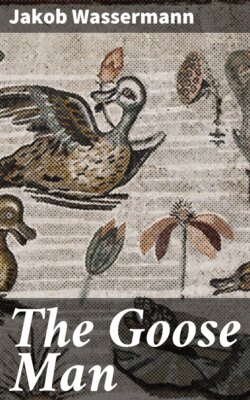Читать книгу The Goose Man - Jakob Wassermann - Страница 12
На сайте Литреса книга снята с продажи.
X
ОглавлениеTable of Contents
He sought out Andreas Döderlein at once. He was told that the professor was not in town. Two weeks later he stood once more before the old house. He was told that the professor could not be seen to-day. He was discouraged. But out of loyalty to his cause he returned at the end of three days and was received.
He entered an overheated room. The professor was sitting in an arm chair. On his knees was his little, eight-year-old daughter; in his right arm he held a large doll. The white tiles of the stove were adorned with pictured scenes from the Nibelungen legend; table and chairs were littered with music scores; the windows had leaded panes; in one corner there was a mass of artfully grouped objects—peacocks’ feathers, gay-coloured silks, Chinese fans. This combination was known as a Makart bouquet, and represented the taste of the period.
Döderlein put the little girl down and gave her her doll. Then he drew himself up to the fulness of his gigantic stature, a process that gave him obvious pleasure. His neck was so fat that his chin seemed to rest on a gelatinous mass.
He seemed not to recall Daniel. Cues had to be given him to distinguish this among his crowded memories. He snapped his fingers. It was a sign that his mind had reached the desired place. “Ah, yes, yes, yes! To be sure, to be sure, my dear young man! But what do you suppose? Just now when all available space is as crowded as a street strewn with crumbs is crowded with sparrows. We might take the matter up again in autumn. Yes, in autumn something might be done.”
A pause, during which the great man gave inarticulate sounds of profound regret. And was the young man, after all, so sure of a genuine talent? Had he considered that art was becoming more and more an idling place for the immature and the shipwrecked? It was so difficult to tell the sheep from the goats. And finally, granting talent, how was the young man equipped in the matter of moral energy? There, indisputably, the core of the problem was to be sought. Or didn’t he, perhaps, think so?
As through a fog Daniel observed that the little girl had approached him and looked him over with a curiously cold and testing glance. Almost he was impelled to stretch out his hand and cover the eyes of the child, whose manner was uncanny to him through some ghostly presentiment.
“I’m truly sorry that I can’t give you a more encouraging outlook.” Andreas Döderlein’s voice was oily, and showed a conscious delight in its own sound. “But as I said, there’s nothing to be done until autumn. Suppose you leave me your address. Put it down on this slip. No? Well, quite as you wish. Good-bye, young man, good-bye.”
Döderlein accompanied him to the door. Then he returned to his daughter, took her on his knee, picked up the doll, and said: “Human beings, my dear Dorothea, are a wretched set. If I were to compare them to sparrows on the road, I should be doing the sparrows but little honour. Heavens and earth! Wouldn’t even write his name on a slip of paper. Felt hurt! Well, well, well. What funny creatures men are. Wouldn’t leave his name. Well, well.”
He hummed the Walhalla motif, and Dorothea, bending over her doll, coquettishly kissed the waxen face.
Daniel, standing in front of the house, bit his lips like a man in a fever who does not want his teeth to rattle. Why, the depth of his soul asked him, why did you sit in their counting-houses and waste their time? Why did you crucify your body and bind my wings? Why were you deaf to me and desirous of gathering fruits where there are only stones? Why did you, like a coward, flee from your fate to their offices and ware-houses and iron safes and all their doleful business? For the sake of this hour? Poor fool!
And he answered: “Never again, my soul, never again.”
